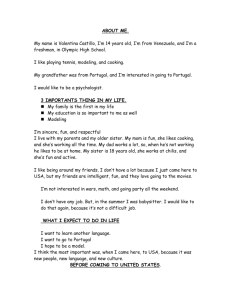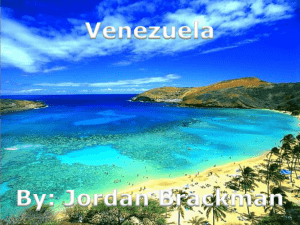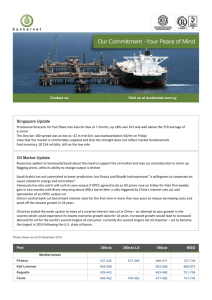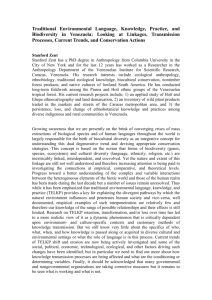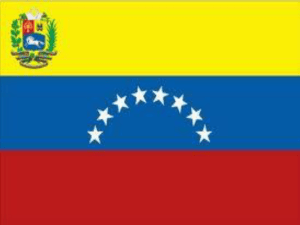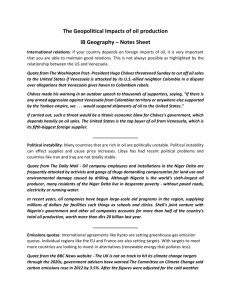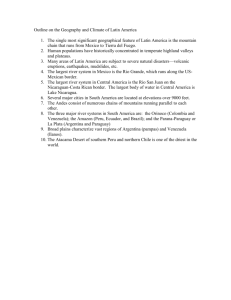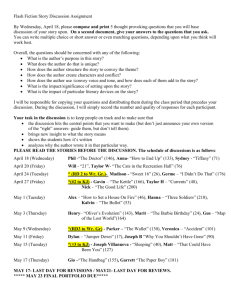Venezuela: Building Economic and Social Justice, Fall, 2008
advertisement
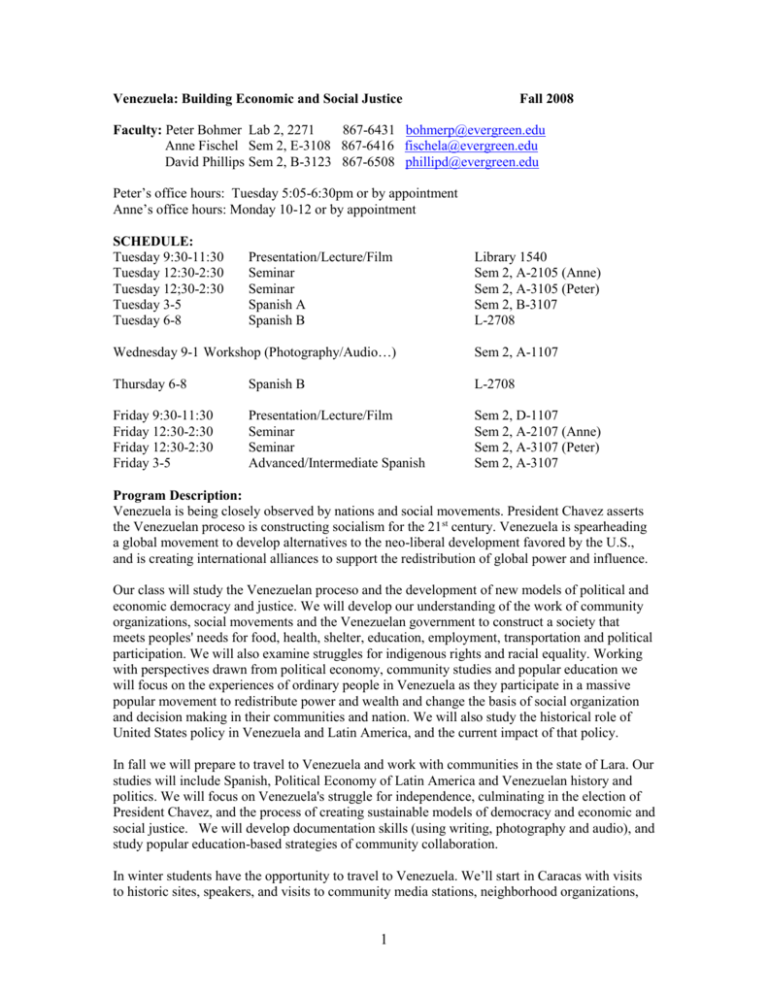
Venezuela: Building Economic and Social Justice Fall 2008 Faculty: Peter Bohmer Lab 2, 2271 867-6431 bohmerp@evergreen.edu Anne Fischel Sem 2, E-3108 867-6416 fischela@evergreen.edu David Phillips Sem 2, B-3123 867-6508 phillipd@evergreen.edu Peter’s office hours: Tuesday 5:05-6:30pm or by appointment Anne’s office hours: Monday 10-12 or by appointment SCHEDULE: Tuesday 9:30-11:30 Tuesday 12:30-2:30 Tuesday 12;30-2:30 Tuesday 3-5 Tuesday 6-8 Presentation/Lecture/Film Seminar Seminar Spanish A Spanish B Library 1540 Sem 2, A-2105 (Anne) Sem 2, A-3105 (Peter) Sem 2, B-3107 L-2708 Wednesday 9-1 Workshop (Photography/Audio…) Sem 2, A-1107 Thursday 6-8 Spanish B L-2708 Friday 9:30-11:30 Friday 12:30-2:30 Friday 12:30-2:30 Friday 3-5 Presentation/Lecture/Film Seminar Seminar Advanced/Intermediate Spanish Sem 2, D-1107 Sem 2, A-2107 (Anne) Sem 2, A-3107 (Peter) Sem 2, A-3107 Program Description: Venezuela is being closely observed by nations and social movements. President Chavez asserts the Venezuelan proceso is constructing socialism for the 21st century. Venezuela is spearheading a global movement to develop alternatives to the neo-liberal development favored by the U.S., and is creating international alliances to support the redistribution of global power and influence. Our class will study the Venezuelan proceso and the development of new models of political and economic democracy and justice. We will develop our understanding of the work of community organizations, social movements and the Venezuelan government to construct a society that meets peoples' needs for food, health, shelter, education, employment, transportation and political participation. We will also examine struggles for indigenous rights and racial equality. Working with perspectives drawn from political economy, community studies and popular education we will focus on the experiences of ordinary people in Venezuela as they participate in a massive popular movement to redistribute power and wealth and change the basis of social organization and decision making in their communities and nation. We will also study the historical role of United States policy in Venezuela and Latin America, and the current impact of that policy. In fall we will prepare to travel to Venezuela and work with communities in the state of Lara. Our studies will include Spanish, Political Economy of Latin America and Venezuelan history and politics. We will focus on Venezuela's struggle for independence, culminating in the election of President Chavez, and the process of creating sustainable models of democracy and economic and social justice. We will develop documentation skills (using writing, photography and audio), and study popular education-based strategies of community collaboration. In winter students have the opportunity to travel to Venezuela. We’ll start in Caracas with visits to historic sites, speakers, and visits to community media stations, neighborhood organizations, 1 and the newly created Bolivarian University. There will be presentations on the current political economy and future possibilities and directions for Venezuela. One half of the group will then journey to Barquisimeto in the State of Lara where each student will work with a community organization and live with a host family for three weeks. . The organizations we’ve identified include urban cooperatives and educational work with adults through Venezuela’s Mision Sucre. We’ll take field trips to deepen our knowledge of the region, and hear from local speakers. Each student will gather research materials--field notes, photographs, documents and interviews--for an independent project. The other half of our group will go to Mérida where we will intensively study Spanish in the morning and meet with community organizations, cooperatives, Venezuelan intellectuals and student groups in the afternoon and evening. After a week-long retreat for our entire program, we will switch locations so everyone will spend three weeks in Barquisimeto and three weeks in Mérida. Funds permitting, we will end our visit with a few days in Caracas. In spring we will return to our own campus to develop our research materials and prepare them for distribution. Possible forms include: a website, presentations, a photography exhibit, or a book or zine. The goal is to share what we learned, educate others, and give back to the communities that supported our learning. We will also continue our study of Venezuela. READINGS: Eduardo Galeano, Open Veins of Latin America Richard Gott, Hugo Chavez and the Bolivarian Revolution Greg Wilpert, Changing Venezuela by Taking Power Myles Horton and Paulo Freire, We Make the Road by Walking Greg Grandin, Empire’s Workshop Robin Hahnel, Economic Justice and Democracy Vijay Prashad and Teo Ballavé, Dispatches from Latin America Mary Lee Bretz, Dvorak, Kirschner and Bransdorfer, Pasajes, Sexta Edición (for students in Spanish A, Tues, Fri, 3-5) José Blanco and Phillip Donley, Vistas, 3rd edition (for students in Spanish B, Tues, Thur 6 P.M.) Articles and short readings will supplement the main texts. Articles will be handed out in class, on the class list-serv, or available from electronic reserve (er). To access items on electronic reserve (er) go to the Evergreen library home page, then to "Program Reserves", then to "Electronic Reserves" and register on ARES so you can access the articles. Articles on photography are taken from Ken Light, ed. Witness in Our Time (Light). We may decide during the quarter to have some of these shorter readings for weeks 7-9 read only by the research group. For students going to Venezuela there are 2 additional texts to read over December break: Eva Gollinger, Bush vs. Chavez Charlie Hardy, Cowboy in Caracas Spanish: (From David Phillips): Section A will include students with at least two quarters of college-level Spanish, or more prior studies; essentially, intermediate and advanced-level students, as well as a few near-intermediate beginners with strong skills. We will use the textbook PASAJES, 6th edition. Students in section A are expected to communicate completely in Spanish in class. Students in A section will have many opportunities for group work, research and writing at a more advanced level. Section B will include students with beginning level skills, with two quarters of prior Spanish studies at college level, or two-three years in high school. If you have less, you will also be in 2 this group. Final decisions regarding language readiness for travel to Venezuela will be made by the faculty near the end of the quarter. In Section B we’ll use the textbook VISTAS, 3rd edition- it is now available in the campus bookstore. It’s costly, but complete and will take you through a year or more of Spanish studies, even after the program. Both sections: use of instructor’s copies of the textbooks is not allowed, and earlier editions are not recommended. WEEKLY CURRICULUM: Week 1: September 30-Oct. 3 Texts: Galeano Open Veins of Latin America Prashad and Ballvé, pp.13-20, 23-31. Film: Kief Davidson and Richard Ladkani, The Devil’s Miner, 80 min., 2005 Tuesday 9:30-11:30: Introduction to the Program Peter—"surplus" and economic development Tuesday 12:30-2:30: Seminar--Galeano Tuesday 3:00-8:00 Introduction to Spanish: Spanish-language tests and placements (**in Seminar 2, A-1105) Wednesday 10-12: Introduction to Documentary Photography Wednesday 12-1: Community Documentation Project Planning Friday 9:30-11:30 Film: Friday 12:30-2:30 Seminar--Prashad and Ballvé, Galeano continued For Friday: (1) 2-page reflective writing on your own social/cultural location, learning goals, obstacles. To be shared with 1-2 other people in seminar; give copy to faculty. (2) seminar paper (all of Galeano) Week 2: Oct. 7-10 Texts: Gott, Hugo Chavez and the Bolivarian Revolution (Friday) Margarita López Maya, Breaking with the Past, NACLA Vol. 40, No. 3, May/June 2007 (handout) pp 4-8 (handout), Sebastião Salgado, Workers (Light--handout) Film: Kim Bartley and Donnacha O'Brain The Revolution Will Not Be Televised (74 min., 2002). Tuesday 9:30-11:30 Peter: Venezuelan Political and Economic History Tuesday 12:30-2:30 Seminar—Gott, parts 1-4 Wednesday 9-10:50 Group 1: Introduction to digital cameras Group 2: Audio recording Wednesday 11:10-1 Group 1: Audio Recording Group 2: Introduction to digital cameras Wednesday 1;30-3 Brown bag lunch: Guest Presenter Simon Sedillo Friday: 9:30-11:30 The Revolution Will Not Be Televised Friday 12:30-2:30 Seminar—Gott, parts 5 and 6, and Epilogue, López Maya, Salgado. Week 3: Oct. 14-17 Texts: Wilpert, Changing Venezuela by Taking Power Wilkinson, "Chavez's Fix," The Nation, 3/10/2008 (er) Graciela Iturbide, The Indigenous of Mexico (Light--er) 3 Film: Dario Azzellini and Oliver Ressler, Venezuela from Below, 2004, 67 minutes. Prashad and Ballvé Tuesday 9:30-11:30 Anne: Creating new institutions in Venezuela Tuesday 12:30-2:30 Seminar—Wilpert, pp.1-149. Wednesday 9-10:50 Group 1: Digital Cameras, part 2 Group 2: Interview practice Wednesday 11:10-1 Group 1: Interview practice Group 2: Digital Cameras, part 2 Wednesday reading: Iturbide Friday 9:30-10:45 Ressler and Azzellini, Venezuela From Below Friday 10:45-11:30 Project Planning Friday 12:30-2:30 Seminar—Wilpert, pp. 151-266, Wilkinson, Prashad and Ballvé, pp. 86-92 Week 4: Oct. 21-24: Text: Freire and Horton, We Make The Road by Walking Film: Lucy Massie Phenix and Veronica Selver, You've Got to Move, 1985, 87 minutes Tuesday 9:30-11:30: Anne and Ellen Shortt Sanchez: Popular education and participatory research; Popular education approaches to literacy Tuesday 12:30-2:30 Seminar, Freire and Horton, Preface, Editor's Intro, Ch. 1-3, pp. 3-143 Wednesday 9-10:50 Group 1**: Editing in Photoshop, introduction to printing Group 2: Project Planning Wednesday 11:10-1 Group 2**: Editing in Photoshop, introduction to printing Group 1: Project Planning **This week photography groups will be reorganized—you will go with your project group to the workshops—Peter and Anne available for project planning and consultation. **Wednesday 3:30-5 Seminar 2, A-1105)) Film: Borders of Resistance (Anne Fischel)—highly recommended (in Friday 9:30-11:30 Friday 12:30-2:30 Film: You've Got to Move Seminar—Freire and Horton, Ch. 4—6, pp. 145-248 Week 5: Oct. 28-November 1st Text: Grandin, Empire's Workshop\ Readings from Prashad and Ballvé Susan Meiselas, Central America and Human Rights (Light-er) Film: Davis, Hearts and Minds Possible segment of 9-11 film by Ken Loach: Letter from Chilean exile? Tuesday 9:30-11:30 Peter: U.S. Foreign Policy Tuesday 12;30-2:30 Seminar—Grandin, Intro., Ch 1-4, pp. 1-158, Meiselas Wednesday 9:15-11 Group 1: Peter: Economics Workshop Group 2: Mixing Benches (audio editing) Wednesday 11:15-1 Group 2: Peter: Economics Workshop Group 1: Mixing Benches (audio editing) **Portfolio and Self-evaluations due 9am at faculty offices. **Thursday 10-12 Highly recommended: Willie Baptist (location TBA) Friday 9:30-11:30 Hearts and Minds Friday 12-2:45 Self-evaluation conferences Friday 12:30-1:45 In project groups: mini-seminar on Grandin (Ch 5, 6, Conclusion and Afterword, pp. 159-244), Prashad and Ballvé, pp. 93-104 4 Friday 1:45-2:30 Project planning **Saturday, 5:00-6:30 Willie Baptist at Camp Quixote, Potluck dinner 6:30-8 at St. John's Episcopal Church. 114 20th Ave SE in Olympia **Anne at APHA conference Monday, Oct. 27-Wednesday, Oct. 29 Week 6: November 4-7 Monday, Nov. 3: Self-evaluation conferences 12-5:30 with seminar leader Text: Robin Hahnel, Economic Justice and Democracy Articles on economic development Eugene Richards, Americans We (Light-er) Earl Dotter, The United Mine Workers (Light-er) Fazal Sheikh, “Portrait of a Refugee” (Light-er)) Dayanita Singh, A Truer India (Light-er) Tuesday 9:30-11:30 Peter: Past and Present Models of Socialism Tuesday 12:30-2:30 Seminar: Hahnel, parts 1 and 2: pp.1-161 Wednesday (Photography work in progress discussion—bring at least 2 prints to this session) 9-10:50: Group 1 11:10-1 Group 2 Wednesday readings: Dotter, Richards, Sheikh, Singh Friday 9:30-11:30: Guest speaker: Robin Hahnel **Research Project outline due by 9:30. **List of Venezuela Travel participants posted by 9am. Friday 12:30-2:30 Seminar: Hahnel, part 3, pp. 165-250 Hahnel: "What is to be Done?" (speech delivered to the First Socialist Economics Forum, Carora, Venezuela, September 2008, class listserv). Week 7: November 11-14 Texts: Hahnel, Prashad and Ballvé and articles on gender, and eocnomic policy Tuesday 9:30-11:30: Guest speaker Cory Fisher-Hoffman Tuesday 12:30-2:30: Seminar: see list of readings on page 7 Wednesday 9-10:50 Group 1: Photographic printing Group 2: Podcasting Wednesday 11:10-1 Group 2: Photographic Printing Group 1: Podcasting ****Deposit for Venezuela travel due by Wednesday at 5pm. Friday 9:30-11:30: Friday 12:30-2:30 Peter: continue economics presentation from week 6 Seminar: Hahnel, pp. 253-385, Prashad and Ballvé, pp. 305-315 Buston, 'Economic Policy and the Rise of Hugo Chavez," (electronic reserve (er) Mark Weisbrot and Luis Sandoval, Update: The Venezuelan Economy in the Chavez Years http://www.cepr.net/documents/publications/venezuela_update_2008_02 Week 8: November 18-21 Texts: Prashad and Ballvé, articles (on-line or er) Tuesday 9:30-11:30: Brenda Biddle, agriculture and food sovereignty in Venezuela Tuesday 12:30-2:30: Seminar: see list of readings on p. 7 5 **Research Project rough draft due in seminar Wednesday 10-1: Student-led presentations Readings for Wednesday: see list on page 8 Friday 9:30-11:30: Films: Cecosesola Cooperative, Vive TV (David Phillips in class) Friday 12;30-2:30: Student-led presentations Readings for Friday: see page 8-9 ***November 24-28: Thanksgiving Break Week 9: Dec. 2-5 Texts: Prashad and Ballvé, articles Tuesday: student-led presentations Readings: Indigenous people/movements, Prashad and Ballvé, pp., 151-265 Wednesday: student-led presentations **possibility to show Five Factories (Ressler and Azellini) Wednesday Readings on page 9 Friday: student-led presentations Friday Topics and Readings: Latin America Left, Solidarity, Grassroots Movements in the Americas: Prashad and Ballvé, pp. 35-46, 59-67; pp. 77-85, 115-147; pp. 283-304, pp. 316-338 Week 10: Dec. 9-12 Tuesday: Photography presentations Wednesday: Photography presentations Research project papers due Friday: Program potluck: wrap-up, debrief, preparing for winter quarter Self-evaluations and portfolios due by 3:00 Friday Evaluation Week: Dec. 16-20 Self-evaluation conferences—required for successful completion of the program Based on: class participation, completed project work, portfolio, and self-evaluation. In order to hold a conference with you—and write your evaluation—we must have all your materials by Friday of week 10. 6 Readings for Week 7: Tuesday seminar Topic 1: Gender 1. Global Women’s Strike, The Revolution has a Woman's Face, in Olivia Burlingame Goumbri, The Venezuela Reader. (er), 2. Sarah Wagner, “Women and Venezuela’s Bolivarian Revolution,” Venezuelanalysis, January 15, 2005 and "The Bolivarian Response to the Feminization of Poverty." Feb. 5th, 2005, http://www.venezuelanalysis.com/analysis/877 http://www.venezuelanalysis.com/analysis/918 3. Fernandes, Sujatha, The Gender Agenda of the Pink Tide in Latin America, Znet,Oct 2007http://www.zmag.org/znet/viewArticle/14305 4. Red Popular de los Altos Mirandinos, Statement from Women Housewives Workers in the Home to President Hugo Chávez, Feb 4, 2005 http://www.globalwomenstrike.net/English2006/StatementFromWomenToChavez.htm 5. Cory Fischer-Hoffman, Venezuela Leads the Way: Welfare Mothers and Grassroots Women are the Workers for Social Change http://upsidedownworld.org/main/content/view/209/1/ 6. Michael Albert and Nora Castañeda, Gender In Venezuela, An Interview with Nora Castañeda, September 20, 2008, http://www.zcommunications.org/znet/viewArticle/18868 7. Selections from Cory Fischer-Hoffman, Misíon Madres del Barrio: A Bolivarian Social Program: Recognizing Housework and Creating a Caring Economy in Venezuela University of Kansas, 2008. (er or listserv) 8. Dalla Costa, Giovanna Franca, Development and Economic Crisis: Women’s Labour and Social Policies in Venezuela in the Context of International Indebtedness, in Paying the Price: Women and the Politics of International Economic Strategy, eds. Mariarosa Dalla Costa and Giovanna F. Dalla Costa (London: Zed Books, 1995), 91-116. (er) Topic 2: Labor 1. Labor: Steve Ellner, “Trade Union Autonomy and the Emergence of a New Labor Movement in Venezuela”, in Ellner and Tinker Salas, ed. Venezuela, Hugo Chávez and the Decline of an Exceptional Democracy(er) 2. Kiraz Janicke & Federico Fuentes, Venezuela’s Labor Movement at the Crossroads, April 29th 2008, http://www.venezuelanalysis.com/analysis/3398 Readings for Week 8; Tuesday seminar Topic 1: Land, Food, Agriculture 1. Samir Amin (2003) World Poverty, Pauperization & Capital Accumulation. Monthly Review. www.monthlyreview.org/1003amin.htm 2. Brenda Biddle, Food Sovereignty, The Encyclopedia of Protest and Revolution 1500 – Present (er) 3. Philip McMichael, (2007) Feeding the World. Socialist Register 2007. New York, Monthly Review. 170-194 (er) 4. Peter Rosset (2006) Food is Different, London and New York, Zed. Pages x-24 (er) 5. Sarah Wagner, Reducing Poverty and Creating National Food Sovereignty in Venezuela June 24,2005, Venezuelanalysis.com, http://www.venezuelanalysis.com/analysis/1211 6. Greg Wilpert, Land for People Not for Profit in Venezuela, Venezuelanalysis.com http://www.venezuelanalysis.com/analysis/1310 Topic 2: Oil 1. Mommer, "Subversive Oil," (er), Ellner and Hellinger, Venezuelan Politics in the Chávez Era 2. Tina Rosenberg, The Perils of Petrocracy, New York Times, November 4, 2007 7 3. Ali Rodriguez interviewed by Greg Wilpert, The Main Obstacle is the Administrative Structure of the Venezuelan State http://www.venezuelanalysis.com/articles.php?artno=1224 Topic 3: Endogenous Development 1. April Howard, Venezuela: Creating an Endogenous Cooperative Culture, September 4, 2008. http://upsidedownworld.org/main/content/view/1457/35 Readings for Week 8: Wednesday Topic 1: Communal Councils, participatory democracy 1. Power to the People: Communal Councils in Venezuela, Federico Fuentes, Green Left Weekly www.Venezuelanalysis.com/analysis/1715 2. Venezuela’s Communal Councils and the Role of Planners, Clara Irazabal and John Foley www.plannersnetwork.org/publications/2008_winter/irazabal.html 3. Venezuela’s Secret Grassroots Democracy, Michael Fox www.zmag.org/znet/viewArticle/2642 4. Reconfiguring Democracy: Venezuela’s New Communal Councils Confront Bureaucracy, Kendra Fehrer Ponniah, Issue 381: Dec. 2007-Jan. 2008 of PeaceWork Magazine www.peacefulworkmagazine.org/ 5. Alex Holland, Venezuela’s Urban Land Committees and Participatory Democracy, Feb. 11, 2006 http://www.venezuelanalysis.com/articles.php?artno=1668 Topic 2: Cooperatives, Worker Control, 1. Prashad and Ballvé, Zibehi, pp. 339-358 2. Camila Piñeiro Harnecker, The New Cooperative Movement in Venezuela's Bolivarian Process http://mrzine.monthlyreview.org/harnecker051205.html Topic 3. Alternative Energy/Environment 1. Cuba-Venezuela: Making Biofuels Without Wasting Food, Patricia Grogg. Inter Press Service, March 6, 2007. www.ipsnews.net/news.asp?idnews=36823 2. Environmental and Social Justice in the Bolivarian Republic of Venezuela: A Model of Growth that is both Sustainable and Progressive. Fact Sheet Published by the Venezuelan embassy, July 2008. www.embavenez-us.org/factsheet/environmentsocialjustice.pdf 3. How Green is the Latin American Left? A Look at Ecuador, Venezuela and Bolivia. Daniel Denvir, Thea Riofrancos, April 3, 2008 http://upsidedownworld.org/main/content/view/1203/1 4. Hugo Chavez’s Archilles Heal: The Environment, Jorge Hinestrozca interviewed by Nikolas Kozloff, Oct. 9, 2006, http://www.venezuelanalysis.com/articles.php?artno=1847 Readings for Week 8; Friday Topic 1: Media: 1. Naomi Klein, Venezuela’s Media Coup, The Nation, February 13, 2003, www.thenation.com/doc/20030303/klein 2. Gregory Wilpert, Community Media in Venezuela, 2003, http://www.venezuelanalysis.com/analysis/221 3. Robert McChesney and Mark Weisbrot, Venezuela and the Media: Fact and Fiction Common Dreams www.commondreams.org/archive/2007/06/06/1607 4. www.livetvcenter.com/vive_tv_1385.asp 5. Nikolas Kozloff – COHA, August 28, 2005, Venezuela Launches Hemispheric "AntiHegemonic" Media, http://www.venezuelanalysis.com/analysis/1095 8 Topic 2: Health/Medical Care: 1. Challenging the neoliberal trend: the Venezuelan health care reform alternative, Muntaner C, Salazar, RM, Benach J., Armada F. Faculty of nursing, Department of Public Health Sciences, University of Toronto, Canadian Journal of Public Health. 2006 Nov-Dec; 97(6) 119-24. 2. Peter Maybarduk, Venezuela: A People’s Health SystemDecember 2004, www.greenleft.org.au/2004/610/31163 3. Dr. B. Padma, Barrio Adentro: as Seen from the Perspective of a U.S. Health ProfessionalAugust 2008, http://www.Venezuelanalysis.com/analysis/3701 Readings for Week 9: Wednesday Topic 1. Afro-Venezuelans, racism 1. Early and Garcia, The Political Status of Afro-Venezuelans in the Bolivarian Revolution, in Olivia Burlingame Goumbri, The Venezuela Reader, pp. 49-66 2. Jesus Maria Herrera Salas, Ethnicity and Revolution, The Political Economy of Racism in Venezuela, Ellner and Tinker Salas, Venezuela, pp. 99-1 Topic 2. Alternatives to neoliberal globalization/institutions 1. Prashad and Ballvé, pp. 68-73 2. Jorge Martinez Gonzalez and Lic. Armando Chible Sandoval, August 8th 2008, “ALBA: A Hope for the Poor, A Challenge to Élites”, http://www.venezuelanalysis.com/analysis/3704 3. Federico Fuentes - Green Left Weekly, July 29, 2008, Latin America’s Struggle for Integration and Independence, http://www.venezuelanalysis.com/analysis/3678 4. Shawn Hattingh, ALBA: Creating a Regional Alternative to Neo-liberalism? February 13th 2008, http://www.venezuelanalysis.com/analysis/3154 5. Stephen Lendman, The Bank of the South: An Alternative to IMF and World Bank Dominance, October 29, 2007, http://www.venezuelanalysis.com/analysis/2770 6. Katie Dickson, Council on Hemispheric Affairs (COHA), Venezuela's Financial Mission in the Caribbean Basin, August 30th 2007, http://www.venezuelanalysis.com/analysis/2574 9 ASSIGNMENTS: 1. SEMINAR PAPERS—1 page, typed, double-spaced, for each seminar Pick a quote from the reading. Explain what it means and why it is important. Develop this further with a paragraph of thoughtful comments or questions to spark discussion. 2. REFLECTIVE WRITING—Write a reflective paper that explores your own social location and background in relationship to our studies. All of us start with our own autobiography and experience. When we’re exposed to new learning, particularly learning about a cultural, social or political reality that is different from our own, we become conscious of ourselves in a new way. Writing as reflection is a tool for working with and integrating new experience. Write this 2-page paper for Friday of week 1. Be prepared to share it with 1-2 other people in seminar. As with all your papers, give a copy to your seminar faculty—when it is returned to you, put it in your portfolio. You’ll be asked to revisit it for your week 5 and week 10 self-evaluations and work with the issues and themes you began to explore early in the quarter. 3. SPANISH Assignments/expectations will be explained on Thursday and Friday of week 1 in Spanish class.. 4. RESEARCH PROJECT Pick a significant aspect of Venezuelan society. A good starting place would be the readings offered weeks 7-9. Possibilities are: Education, Health Care, Political Institutions (Communal Councils), Cooperatives, Oil/Environment/Alternative Energy, Woman, Labor/Unions/New Models of Industrial Governance; Venezuela's relationships with Latin America; Foreign Policy/Globalization; Socialism for the 21st Century; U.S. Foreign Policy towards Venezuela; Indigenous Rights; Race and Ethnicity in Venezuela, Agriculture/Land Reform, Employment/Economy and the Informal Sector. You will be working in a group of 5-6 people who are focused on similar topics. The group is a resource—use it to share information, develop a sense of context and an analytical framework, and get feedback and critique on your research and writing. Draw on class readings and films and integrate them with your original research (journals, books, on-line materials, newspapers). You might outline and/or write the contextual segment of your paper with your group. It’s acceptable for 2 people to collaborate on a research topic. Research project deadlines: Friday, Week 3—Class discussion of topics. Be prepared to state your research interest, find others with common topics, and form a research group. Wednesday, Week 5—Your research group’s bibliography of sources due: journal articles, books, websites. At least 5 sources for each individual project, some of which must be print sources, not from the web. To be submitted with your portfolio. Friday, Week 6: Submit an outline in sentence form. Tuesday, Week 8: Rough Draft due—this should cover most of the significant elements of your topic, prepare you for your final presentation to the class, and demonstrate substantial progress towards your final paper. 10 Weeks 8 or 9: Your group will lead a learning activity. This could include: a presentation by group members, a discussion, or some other activity that your group designs and facilitates that allows us to learn from your research. One hour/group, followed by a 30-minute response by another research group and your faculty. Week 10—Individual research papers due Wednesday by 1:00. 5. PORTFOLIO A portfolio should be well organized, into the following sections: -Syllabus, covenant, other similar documents -Notes on class lectures, presentations, films, seminar discussions -Class handouts -Seminar papers -Reflective Writing—due week 1, draw on for week 5 self-evaluation, revise for week 10. -Technical information (photography workshop) -Photography Project documentation: field notes, planning, interview log and transcript, script -Research Project documentation: paper, bibiliograpy, outline, paper draft, project group discussion notes, research notes, critical feedback from your faculty or other readers, final paper. -Notes on week 5 conference with your faculty -Week 5 and Week 10 Self-evaluations Portfolio due weeks 5 and 10—flag 2 seminar papers each time for your faculty to read. 6. PHOTOGRAPHY ASSIGNMENT: In groups of 3-4, research and document the work of a local community organization. Your research should include available documents, participant observation, an audiotaped interview, and documentary photographs. Create a presentation that draws on and utilizes all the elements— research, audio, photography. Your presentation should educate us what the organization does, how it works, and provide key insights into its history, functioning, successes and challenges. We will present the results of our work to our Venezuela partners in January. Possible modes of presentation: photo exhibit, power point slide show, zine or book, website. The mode of presentation depends on how you would like your project work to be received and used.? This assignment has a dual focus. You are working with a local community organization to document their work. You are also exploring approaches to documentary photography, discussing them with your group and evaluating their appropriateness to your own work. In preparation spend view and discuss possible project models: books of photography, on-line websites, etc. Some collections of photography have been placed on open reserve in the library, but this is only a starting place. Feel free to explore our library collection to find models that interest you. You may consult the website sources listed below, but this list is just a starting point; we encourage you to do your own research as well. Document this research in your portfolio. You are expected to keep a log of your activities—contacts made, meetings, activities attended, interviews and photo sessions. Keep notes of your conversations with people, even if they are brief or summarized—they will help you develop your interview questions and your script. Project Deadlines: Wednesday, Week 2: A 1-paragraph description of your project, including organization, contact person, rational for choosing this group, and names of all project group members. 11 Friday, Week 4: One-page progress report, including research on photographers or photographic projects and the method of exhibition you have decided on. Include any concerns, challenges, including ethical concerns related to the representation of your subjects. Friday, Week 7: Script Due Tuesday or Wednesday of Week 10: Presentations due. Include all project materials in portfolio. Project Methodology—Step by Step: 1. Does the organization have a website? Look at its description and mission statement. What issues is the group trying to address? 2. Contact the organization, schedule a meeting, explain what you want to do and ask permission to do it. Identify opportunities to observe and participate. Ask for guidelines—do's and don't's. You may also be asked to do some volunteer work. 3. After spending time observing/participating, request an interview. Prepare questions carefully. Your interview will be audio recorded. The person conducting the interview should not take photographs or monitor the sound at the same time. 4. Log the interview. Transcribe relevant portions. Review and discuss with your group. Develop a working script using your selected audio segments (no more than 10 minutes). Use to identify needed visual elements to photograph. 5. Review photographs and select the best images. Be rigorous. You might end up with 1520 images in a power point presentation; 10 for a book or zine or a photo exhibit. Try to create a mix of kinds of visual information—faces, activities, physical space…The photographs should complement and support the audio elements included in your script. 6. Due week 10: presentation, project notes (research notes, interview questions, audio logs, script, and a short individually written reflection on your work). WEBSITE SOURCES: we will add to this list throughout the quarter 1. www.venezuelanalysis.com Good writing about contemporary Venezuelan developments, links to other good sources. Extensive archive. Co-founded by Greg Wilpert. 2. www.rebelion.org Spanish-language news site 3. www.upsidedownworld.org Activism/politics in Latin America 4. www.narconews.com Began with a focus on the politics of the drug war in Latin America but also includes broader coverage of Latin American politics. 5. www.zmag.org An extensive website—znet has searchable on-line articles about Venezuela 6. www.aporrea.org Spanish-language Venezuelan news site; supports the Bolivarian project and “Socialism for the 21st Century” 7. www.ipsnews.net Inter Press Service (very comprehensive news, also in Spanish) 8. www.nacla.org (excellent journal on Latin America, has good current news on-line also) 9. www.cepr.org (good articles on Latin America, economics in English and Spanish) 10. www.radiomundoreal.fm/rmr Real World Radio (RWR) is a multilingual radio on the web, under the auspices of Friends of the Earth International (FoEI). RWR was born in 2003, during the World Trade Organization's Fifth Ministerial Conference, to support resistance to the event. 11. www.abn.info.ve Agencia Bolivariana de Noticias (in Spanish)—check with David Phillips for more Spanish links 12. www.viacampesina.org Via Campesina, The Via Campesina is the international movement of peasants, small- and medium-sized producers, landless, rural women, indigenous people, rural youth and agricultural workers. The concept “food sovereignty” was first introduced by the Via Campesina in 1996. (particularly relevant for week 8) 13. http://www.landaction.org Land Research Action Network, LRAN is a response to a gap in research/analysis support for grassroots movements around the world who are engaged in struggles over access to land and other resources. (particularly relevant for week 8) 12
